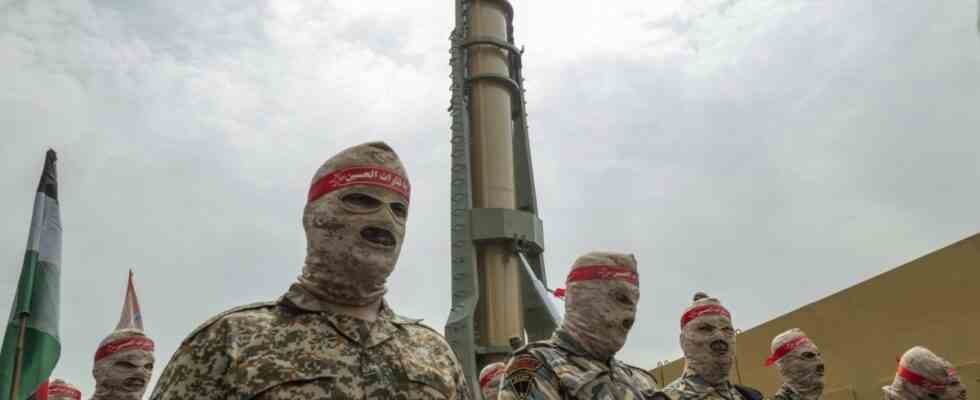Immediately before the EU foreign ministers’ conference on Monday, Iran warns against implementing the EU Parliament’s demand and classifying the Iranian Revolutionary Guards as a terrorist group. Last week, the majority of MPs spoke out in favor of stricter sanctions against representatives of the regime. The decision of the EU Parliament is not legally binding for the member countries.
The EU foreign ministers now want to decide which sanctions against the Iranian regime will be tightened. Iranian Foreign Minister Hossein Amir-Abdollahian had already warned EU foreign policy chief Josep Borrell of the negative consequences of measures taken against the troops, known in Persian as Pasdaran.
After a meeting with the Iranian parliament, the commander of the guard, Hussein Salami, spread rumors that foreign tankers could be detained or access to the Strait of Hormuz restricted. The strait is a bottleneck for the global oil supply. But after the delivery of Iranian drones to Russia and the rumors that the Pasdaran could send fighters from its allied Hezbollah militia to fight in Ukraine, the EU will increase its pressure on the Iranian regime despite the threats. Federal Foreign Minister Annalena Baerbock has long advocated classifying the Revolutionary Guards as a terrorist organization. This has already happened in the USA, and the British government is currently implementing a listing that has already been decided.
But for an organization in the EU to be classified as a terrorist, a judicial investigation would have to be carried out in at least one member state against the more than 210,000-strong force. It would probably be years before the Pasdaran units could be proven directly responsible for the murders and arrests of demonstrators. Even economic sanctions against the Guards would not have an immediate effect.
Mobile phone companies, hotels and airlines: The Pasdaran have an economic empire
The extensive network of informal companies and armaments factories has only been partially identified by the United Nations investigators who have been active for years. With their own mobile phone companies, hotels and airlines, the Pasdaran have an economic empire. The Revolutionary Guard currently conducts most of its international business through banks and shell companies in neighboring Iraq. The EU foreign ministers will probably decide on Monday to sanction individual representatives of the Revolutionary Guards. More than 40 names have been mentioned from diplomatic circles. In addition to entry bans and the blocking of accounts, investigations into human rights violations could also follow.
Even Josep Borrell’s diplomatic choice of words to the Iranian foreign minister suggests that the top diplomats in Brussels will probably not listen to the EU parliamentarians. As an organization, the Pasdaran will probably remain untouched. “The high representative thinks it would be a bad idea to cut off all communication channels to Tehran,” said an EU diplomat. Borrell apparently fears that a diplomatic escalation with the regime will make reviving the nuclear deal impossible.
But from the point of view of many Iranians, a cosily approach to the Revolutionary Guards harbors the danger of a coup. Because the longer the mullahs fail to end the street protests, the more likely it is that the Pasdaran will take power.
These were founded as a volunteer army during the Islamic revolution in 1979. In order to prevent a possible attempt to overthrow the army, Ayatollah Ruhollah Khomeini formed a powerful parallel army under his personal control. The Pasdaran now have an air force, navy and several secret services. Because of their control of Iran’s missile and nuclear research program, they have already become the de facto most powerful institution in the country.
The Guards could seize power in the country in no time
The vacuum that an illness or the death of 83-year-old revolutionary leader Ali Khamenei would create would play into the hands of the paramilitaries and their allied Basij district militias. The majority of members of the government, like President Ebrahim Raisi, already come from the ranks of the Guard. “Nevertheless, effective sanctions against the Revolutionary Guards pose a serious threat to the regime’s engine, which is already sputtering,” an economics expert from Tehran told the SZ. “The simple Pasdaran will not give up, since they would lose their social status with the end of the regime, but the leadership lets their children study abroad.”
The population, which continues to protest almost every day, would hardly accept a military dictatorship of the Revolutionary Guards. The brutal crackdown by Pasdaran units in recent months has also drawn criticism from supporters of the regime. Three years ago, hundreds of thousands of Iranians took to the streets in solidarity with them when the head of foreign forces, Qasem Soleimani, was killed by an American drone. In recent months, most of Soleimani’s publicly displayed posters have been torn down or damaged.

